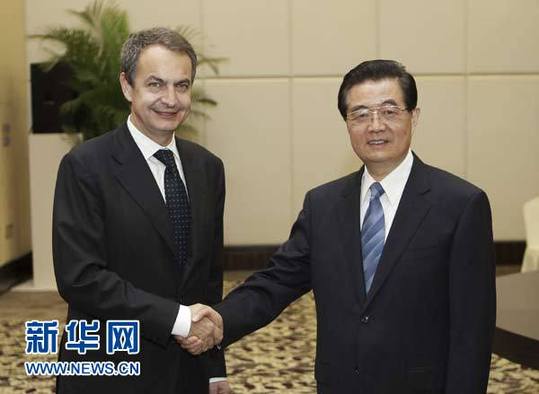The milestone for strengthening the Sino-Spanish partnership
|
|
|
Chinese President Hu Jintao met Spanish Prime Minister Jose Luis Rodriguez Zapatero in China's southern resort city of Sanya on April 14, 2011. [Xinhua photo] |
Last week, Spanish Prime Minister José Luis Rodríguez Zapatero paid an official visit to China and had formal talks with Chinese Premier Wen Jiabao and Vice Premier Li Keqiang. Zapatero came away with assurances from senior Chinese leaders of their willingness to continuously buy Spanish government bonds, which will provide strong support for tackling the sovereign debt crisis and further enhance Sino-Spanish relations. Furthermore, China's financial support will stimulate Spain's economic recovery and play a significant role in alleviating its high unemployment rate while advancing sound bilateral economic and trade relations and consolidating the bilateral political foundation. Going forward, a new pattern of economic cooperation between Spain and China is emerging with the following features:
Creative industries based on language and culture will be more important for China-Spain relations.
As globalization progresses, China and Spain's languages will play a more important role in deepening relations. As Zapatero said in his speech on the value of Spanish, in addition to being the vehicle for communication, creation and cohesion for millions of Spanish speakers, "the Spanish language is unarguably a channel for economic development and the generation of wealth," not only for the revenue derived from the teaching of Spanish but also for the entire industry associated with language, such as editorial production, film, music and television.
China-Spain technology and trade cooperation will reach their great potential based on their comparative advantages and key projects.
In order to advance a mutually beneficial relationship, long-term cooperation in economy and trade and science and technology will be necessary. During Vice Premier Li's official visit to Spain in early 2011, the two nations signed 16 agreements pertaining to economics and trade, with the majority in industries with high comparative technological advantages for Spain. Then on April 13, both Chinese and Spanish companies signed new agreements valued at 1 billion euro, involving key industries such as finance, wind power, helicopter manufacturing, and innovation and technology.
China will actively promote and enlarge imports of goods from Spain with comparative advantages and famous brands, aiming at adjusting and optimizing the pattern of trade. China has purchased olive oil, wine, Spanish ham valued at 10 million euro, and it will continuously open market access for Spanish firms. Based on the new agreements, renewable energy and banking will be two of the key elements in Sino-Spain economic and trade cooperation, which will expand investment avenues between the two countries.
An example of this economic cooperation can be seen in the case of the Spanish wind power company Gamesa. During the prime minister's visit, Gamesa reached three memoranda of understanding (MOU) with the power companies Longyuan, China Resources Power (CRP) and Datang, which may culminate in firm contracts in coming months to supply turbine capacity of 900 MW. Additionally, Gamesa has agreed to jointly develop wind farms (200 MW) with Longyuan by 2015.
Since entering the 21st century, Sino-Spain trade has developed rapidly and bilateral trade volume has increased annually. Currently, Spain is China's sixth EU trade partner and is Spain's biggest trade partner beyond the EU. However, the bilateral trade volume is still low with limited economic cooperation. In the future there will be more potential to expand economic and trade cooperation between Spain and China.
Spain must customize travel guides in order to attract more Chinese tourists.
Spain is promoting itself as a prime destination for Chinese tourists. The government hopes to lure 300,000 Chinese tourists annually, and by 2020, attract 1 million annually. But that objective remains a long way off. According to statistics, in 2009 there were 89,523 Chinese tourists in Spain – up 3 percent from the previous year. But taken in the context of China's 1.3 billion population, this amount is almost negligible. Yet the number of Chinese tourists is growing rapidly, and it is very important for Spain to seriously consider cultural differences in its approach to attracting Chinese tourists. To this end, Spain should design customized travel maps and guides for Chinese tourists.
More substantive cooperation will serve to strengthen the China-Spain comprehensive partnership and give it significant meaning – elevating the expression "Spain is the best friend of China within the EU" to strategic and cultural significance.
Zhang Min is dean of Science and Technology Policy Division at the Institute of European Studies, General Secretary of Center for Spanish Studies, CASS.
 0
0 








Go to Forum >>0 Comments